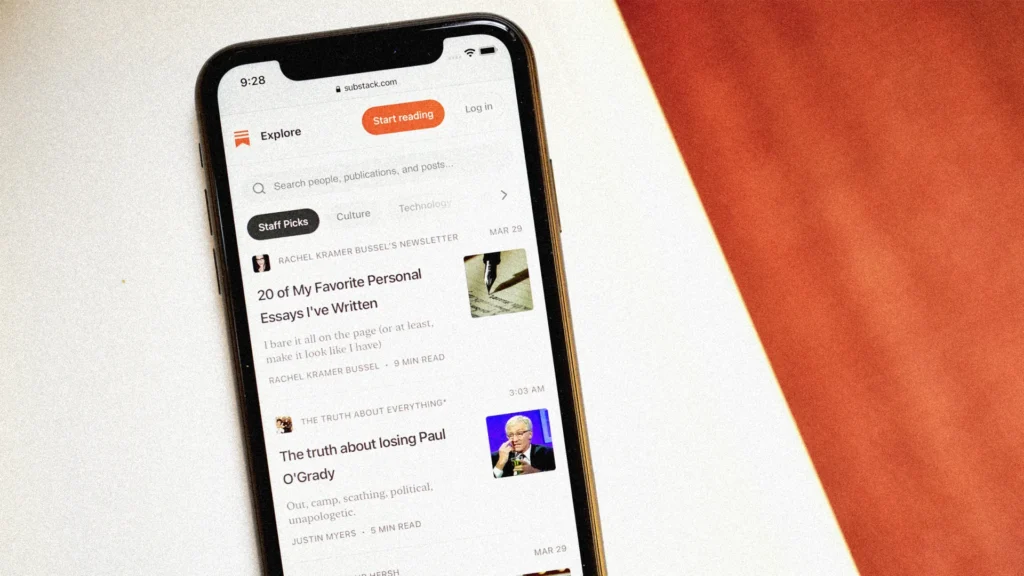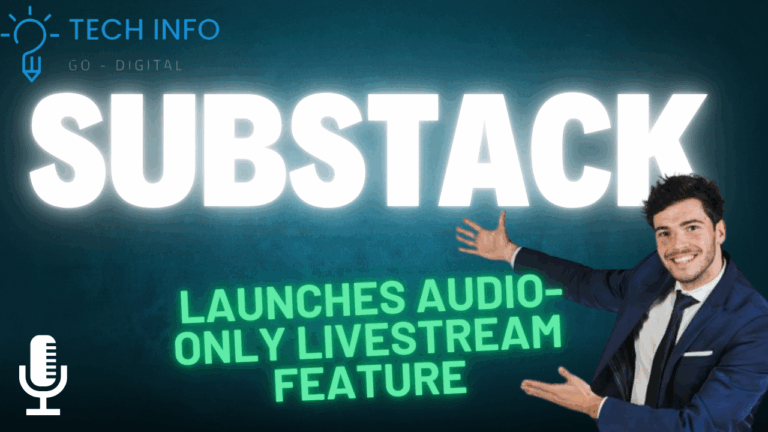Table of Contents
ToggleSubstack Launches Audio-Only Livestream Feature: Reinventing Creator-Audience Dynamics in the Post-Podcast Era

The digital content landscape is undergoing its most radical transformation since the rise of YouTube and TikTok, and Substack—a platform synonymous with email newsletters—is making a bold play to lead the next wave. On May 6, 2025, Substack announced the global rollout of its audio-only livestream feature, a move that merges the intimacy of podcasting with the urgency of real-time engagement. But this isn’t just another tech update; it’s a strategic gambit to redefine how creators monetize, audiences consume, and communities interact in an era oversaturated with content. Let’s unpack why this launch matters and what it signals for the future of digital media.
From Newsletters to Neo-Radio: Substack’s Evolution
Substack’s journey began as a sanctuary for writers fleeing algorithmic feeds and ad-driven models. By 2023, it had already expanded into video essays and pre-recorded podcasts. The introduction of live audio streaming marks its most audacious pivot yet. Unlike Spotify’s Anchor or Patreon’s static audio posts, Substack’s livestream tool is designed to work in tandem with its existing infrastructure:
- Seamless integration with paid subscriptions (creators can restrict streams to paying members)
- Interactive Q&A modules synced with chat functionality
- Automated post-stream transcripts for repurposing into newsletters or social clips
This isn’t just a feature—it’s an ecosystem play. By layering live audio atop its subscription engine, Substack positions itself as a one-stop shop for creators who want to build and monetize deep, multi-format relationships with audiences.
The Audio Renaissance: Why Now?
Audio’s resurgence isn’t accidental. In a post-TikTok world, audiences are fatigued by visual overload. Pre-2025 data reveals:
- 72% of Gen Z prefer audio content for “passive consumption” (e.g., while commuting or working)
- Live audio apps saw a 140% surge in usage after Twitter Spaces’ 2021 debut
- Podcast ad revenue is projected to hit $4.7B by 2025, but creators crave alternatives to ad splits
Substack’s move capitalizes on these trends while addressing creator pain points. Traditional podcast platforms like Apple Podcasts or Spotify take hefty revenue cuts (up to 30%) and offer limited direct monetization tools. Substack flips the script: creators keep 90% of subscription revenue, and now, live audio becomes a premium perk to justify $5–$20/month tiers.
Case Study: Early Adopters Rewriting the Rules
Substack’s beta testers—a mix of journalists, niche educators, and indie musicians—have already showcased the feature’s disruptive potential:
1. The Investigative Journalist
Sarah Lin, an award-winning reporter covering AI ethics, uses live audio streams to:
- Host real-time debriefs after major tech conferences (exclusive to paid subscribers)
- Conduct off-the-record interviews with whistleblowers, with recordings auto-deleted post-stream
- Offer Q&A sessions where subscribers vote on topics via integrated polls
Result: A 40% spike in conversions for her $15/month “Insider Access” tier.
2. The Indie Musician
Jake Rivera, a lo-fi hip-hop artist, streams live beat-making sessions where subscribers request samples or rhythms. Post-stream, he packages the finished track as a downloadable NFT—a perk for top-tier members.
3. The Micro-Community Builder
Dr. Priya Rao, a historian focusing on Southeast Asian folklore, hosts live storytelling nights with rotating guest speakers from her subscriber base. These streams double as oral history archives, later transcribed into Substack post
The Strategic Calculus: Substack vs. The Titans
Substack isn’t just competing with newsletter platforms like Ghost or Beehiiv—it’s now tangling with audio giants:
| Platform | Monetization Model | Creator Cut | Live Audio Tools |
|---|---|---|---|
| Substack | Subscription-first | 90% | Paid tiers, Q&A, transcripts |
| Spotify Live | Ad-supported | 50–70% | Basic interaction |
| Twitter Spaces | Free | $0 | Super Follows (limited) |
| Patreon | Hybrid (subscription) | 88–95% | Pre-recorded audio only |
Substack’s edge lies in its bundled value proposition: creators can weave live audio into a broader content strategy without fragmenting their audience across platforms.
Challenges Ahead: The Roadblocks Substack Must Navigate

- Discovery Dilemma: Unlike TikTok or YouTube, Substack lacks a viral recommendation engine. Creators must still rely on off-platform marketing to grow audiences.
- Technical Hurdles: Early users report latency issues during peak traffic. For a platform built on reliability, even minor glitches could erode trust.
- Content Moderation: Live audio’s ephemeral nature raises risks—hate speech, misinformation—that Substack’s hands-off ethos may struggle to address.
The Future of Substack: Predictions for 2026–2030

- AI-Powered Tools: Imagine AI clipping highlights from 2-hour streams into TikTok-ready reels, all auto-posted to a creator’s Substack.
- Hybrid Monetization: Tiered subscriptions could unlock escalating perks—e.g., $5/month for newsletters, $20 for live streams + 1:1 office hours.
- Globalization: Localization tools for non-English creators, tapping underserved markets like India’s booming regional-language audio scene.
A New Paradigm for the Attention Economy
Substack’s audio livestream launch isn’t merely a feature update—it’s a declaration that the future of content isn’t about platforms but ownership. By giving creators the tools to own their audience relationships and revenue streams, Substack is challenging the extractive models of social media giants. In 2025, as AI-generated content floods the web, the human touch of live audio—raw, unedited, and communal—might just be the differentiator that saves (and redefines) digital creativity.





